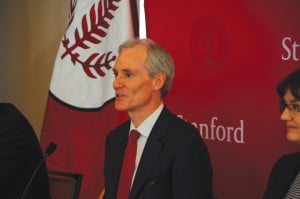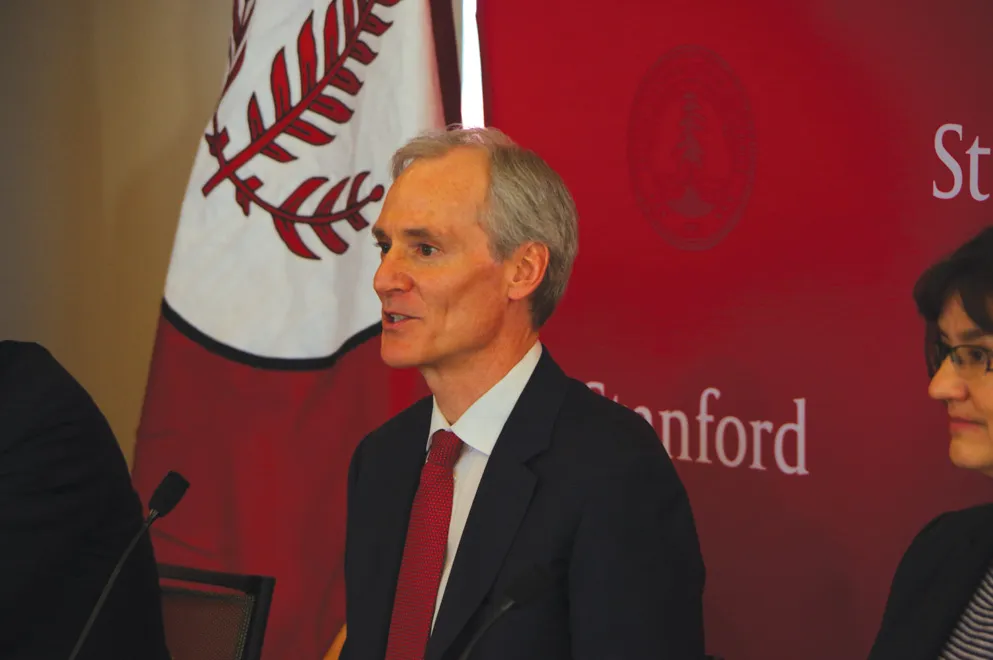The Board of Trustees announced today that Marc Tessier-Lavigne, current president of The Rockefeller University in New York and former Stanford faculty member, has been selected as the 11th president of Stanford University, effective Sept. 1.

Tessier-Lavigne, 56, has led The Rockefeller University, a prominent biomedical research institution and graduate school, for the last five years. Prior to his time at Rockefeller, he served as executive vice president for research and chief scientific officer at Genentech, Inc. Additionally, he was a professor of biological sciences at Stanford from 2001 to 2005.
The Presidential Search Committee unanimously presented Tessier-Lavigne as their selection to replace current president John Hennessy, who announced last June that he intended to step down after the 2015-16 academic year. The Board unanimously approved the committee’s choice.
In the official announcement at noon, Board members and members of the search committee cited in their decision Tessier-Lavigne’s broad academic and managerial experience, bridging both industry and higher education.
“Marc has a remarkable record of achievement,” Board member and chairman of the search committee Isaac Stein J.D. MBA ’72 said to the Stanford News Service. “What we have learned through this search, without exception, is that he has made every institution he has touched far better for his presence. He has a unique combination of personal humility and confidence, and we believe his commitment to the excellence of Stanford — in all of its parts — will be a hallmark of his leadership. We are pleased that from a diverse pool of outstanding candidates, we found in Marc a leader who is an ideal match for Stanford today.”
Chair of the Board of Trustees Steve Denning MBA ’78 emphasized Tessier-Lavigne’s personal qualities, including his upbeat but measured nature and his boldness, respect, humility and intelligence.
“He had boundless enthusiasm and energy to pursue this job, to take on this job, to take on new challenges and pursue new opportunities,” Denning said.
“Every institution Marc has touched has emerged better because of his leadership,” he added. “Stanford is a leader among leaders. We need a president who will also be a leader among leaders.”
In statements to The Daily, both Hennessy and Provost John Etchemendy Ph.D. ’82 praised Tessier-Lavigne’s qualifications.
“This is terrific news,” said Etchemendy, who will be continuing as Provost next year to ensure a smooth transition. “He is a tremendous scholar and leader, and I’m very excited to work with him.”
Born in Canada, Tessier-Lavigne attended school in France for most of his childhood. He studied physics as an undergraduate at McGill University and proceeded to earn a second bachelor’s degree in philosophy and physiology as a Rhodes Scholar. He later earned his Ph.D. from University College London in physiology.
Tessier-Lavigne enjoyed a two decade-long career in academia at various institutions in the Bay Area before joining Genentech and then Rockefeller in 2011. Tessier-Lavigne’s tenure at Rockefeller included launching a $1 billion capital campaign, overseeing a campus expansion, developing interdisciplinary studies programs and revamping existing graduate program.
Throughout his experiences in both industry and academia, Tessier-Lavigne has always found opportunities to continue his research in neuroscience. Recognized as one of the world’s leading authorities on brain development and repair, Tessier-Lavigne has won numerous awards for his studies of degenerative brain diseases, including Alzheimer’s and Parkinson’s disease. His work has investigated how neural circuits in the brain form during embryonic development, how nerve cells respond to injury and the mechanisms underlying nerve cell death.
Speaking at the announcement conference, Tessier-Lavigne thanked Hennessy and introduced himself and his primary objectives as the University’s next president. Expressing his dedication to the concept of a liberal arts education, he remarked that a Stanford education should focus on “not just imparting knowledge and skills, but opening young minds…[and] deriving knowledge because firstly it enriches the human experience but also because of its practical application.”
Tessier-Lavigne emphasized his goals of upholding Stanford’s status as a premiere research institution while achieving focus and innovation in STEM fields but also in the social sciences, humanities and arts. Before concluding, he touched upon fostering an inclusive campus community, the health of the campus environment and diversity; addressing sexual assault; and making the University accessible to all students regardless of financial need.
“The Presidential Search Committee has said that the Stanford presidency is the best job in higher education,” Tessier-Lavigne said. “I have to say I agree with that one.”
Contact Victor Xu at vxu ‘at’ stanford.edu and Michael Gioia at mgioia2 ‘at’ stanford.edu.
